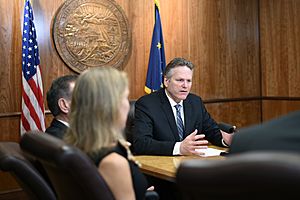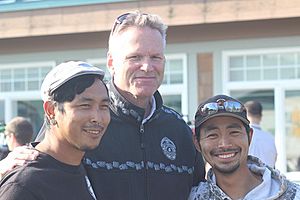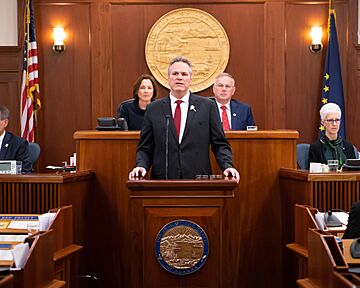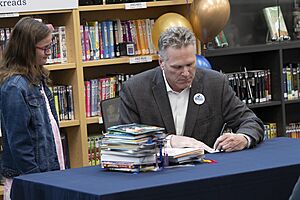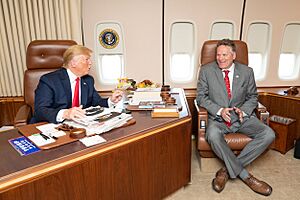Mike Dunleavy (politician) facts for kids
Quick facts for kids
Mike Dunleavy
|
|
|---|---|

Official portrait, 2022
|
|
| 12th Governor of Alaska | |
| Assumed office December 3, 2018 |
|
| Lieutenant | Kevin Meyer Nancy Dahlstrom |
| Preceded by | Bill Walker |
| Member of the Alaska Senate from the E district |
|
| In office January 15, 2013 – January 15, 2018 |
|
| Preceded by | Redistricted |
| Succeeded by | Mike Shower |
| Constituency | District D (2013–2015) |
| Personal details | |
| Born |
Michael James Dunleavy
May 5, 1961 Scranton, Pennsylvania, U.S. |
| Political party | Republican |
| Spouse | Rose Newlin |
| Children | 3 |
| Residence | Governor's Mansion |
| Education | Misericordia University (BA) University of Alaska Fairbanks (MEd) |
Michael James Dunleavy (born May 5, 1961) is an American politician and former teacher who has served as the 12th governor of Alaska since 2018. As a member of the Republican Party, he was an Alaska State Senator from 2013 to 2018.
Dunleavy won the 2018 election to become governor. He was re-elected in 2022, becoming the first Republican governor of Alaska to win a second term since 1978.
Early Life and Career
Mike Dunleavy was born in Scranton, Pennsylvania. After high school, he earned a degree in history from Misericordia University. In 1983, he moved to Alaska, where his first job was at a logging camp.
Later, Dunleavy earned a master's degree in education from the University of Alaska Fairbanks. He worked for almost 20 years in northwest Alaska as a teacher, principal, and superintendent. His wife, Rose, is from Noorvik, a community in the Kobuk River Valley. They have three children.
In 2004, his family moved to Wasilla. Before being elected to the Alaska Senate, Dunleavy served on the Matanuska-Susitna Borough School District board.
Alaska State Senator
In 2012, Dunleavy was elected to the Alaska Senate. He represented the Matanuska-Susitna Valley area. During his time as a senator, he worked on many committees. These included committees for education, finance, and labor.
He was a strong supporter of giving families more choices in education. In 2013, he sponsored a law that allowed parents of homeschooled students to use state money for educational supplies from different organizations. This law passed in 2014 and gave families more flexibility in how they educated their children.
Dunleavy served in the Senate until he resigned in 2018 to focus on his campaign for governor.
Governor of Alaska
As governor, Dunleavy is the head of Alaska's executive branch. He is responsible for carrying out state laws and overseeing state government.
Elections
2018 Election
In 2017, Dunleavy announced he would run for governor. He resigned from the Senate in January 2018 to focus on his campaign. He won the election in November 2018 and was sworn in as governor on December 3, 2018.
2022 Election
Dunleavy ran for a second term in 2022 and won. He was the first governor of any party to be re-elected in Alaska since 1998.
First Term as Governor
Just three days before Dunleavy took office, a powerful 7.1 magnitude earthquake hit Southcentral Alaska. It caused major damage. Dunleavy worked with the previous governor's team to manage the emergency response. He later requested and received federal disaster aid from President Donald Trump to help with repairs.
In 2019, Alaska faced a severe wildfire season, with 2.6 million acres burned. Dunleavy declared a disaster to provide financial help to those affected by the fires.
State Budget
In 2019, Governor Dunleavy made significant cuts to the state budget. This included reducing state funding for the University of Alaska. These cuts led to a public debate about the state's spending priorities.
In 2020, Dunleavy agreed to pay back the state $2,800 for ads that were paid for with state money but were seen as political. He did not admit to doing anything wrong but said it was best to resolve the issue.
Recall Attempt
In 2019, a group of citizens started an effort to remove Governor Dunleavy from office. This is called a recall. They were unhappy with his budget cuts. The "Recall Dunleavy" group collected enough signatures to move forward.
The state government initially rejected the recall petition. However, the Alaska Supreme Court ruled in 2020 that the recall effort could proceed. In the end, the group did not collect enough signatures to force a special election. Dunleavy completed his term and was re-elected in 2022.
Political Positions
As a politician, Governor Dunleavy has taken clear stances on many important issues facing Alaska.
Economy and Energy
Dunleavy has focused on growing Alaska's economy. He supports major projects like the Alaska LNG Project. This project would build an 800-mile pipeline to transport natural gas from the North Slope to be sold to countries in Asia.
In 2023, he changed the rules for most state jobs, removing the requirement for a four-year college degree. He said this would open up more job opportunities for people with different types of training and experience.
Carbon and Renewable Energy
Dunleavy has also explored new ways for the state to make money. In 2023, he signed a law to create a carbon market. This allows companies to pay Alaska to store carbon dioxide underground, which helps reduce air pollution.
He has also shown support for renewable energy, like wind and hydro power. In 2022, he hosted the first Alaska Sustainable Energy Conference to discuss how Alaska can use its renewable resources.
Education
Improving education has been a key goal for Dunleavy. In 2022, he signed the Alaska Reads Act into law. This program focuses on helping students from kindergarten to third grade become better readers. It provides extra help for struggling readers and special training for teachers. Early results in 2024 showed that reading skills improved for many young students.
Crime and Public Safety
When Dunleavy became governor, he promised to be tough on crime. One of his first actions was to repeal a 2016 law known as SB91. Many people blamed that law for a rise in crime because it had lowered punishments for some offenses.
In 2019, Dunleavy signed a new law, HB49, which increased penalties for many crimes. From 2019 to 2023, Alaska's overall crime rate dropped by about 31%.
His administration also cleared a large backlog of evidence kits from serious crime cases, ensuring they were processed in a timely manner.
Alaska Permanent Fund Dividend (PFD)
The PFD is a yearly payment from Alaska's oil wealth savings account that goes to most residents. Dunleavy has consistently argued for paying the largest possible dividend allowed by the original formula.
During his time as governor, the amount of the PFD has been a major topic of debate in the state legislature. He has proposed protecting the dividend in the Alaska Constitution so that its payment is guaranteed.
Environment and Resources
Dunleavy has worked to give Alaska more control over its own land and resources. In 2021, he launched the "Unlocking Alaska" initiative. This effort aims to confirm state ownership of rivers and lakes that were promised to Alaska when it became a state.
He has also supported resource development projects, such as mining and oil drilling. He believes these industries are important for Alaska's economy.
Images for kids
Electoral history
| Party | Candidate | Votes | % | |
|---|---|---|---|---|
| Republican | Mike Dunleavy | 43,802 | 61.5 | |
| Republican | Mead Treadwell | 22,780 | 32.0 | |
| Republican | Michael Sheldon | 1,640 | 2.3 | |
| Republican | Merica Hlatcu | 1,064 | 1.5 | |
| Republican | Thomas Gordon | 884 | 1.4 | |
| Republican | Gerald Heikes | 499 | 0.7 | |
| Republican | Darin Colbry | 416 | 0.6 | |
| Total votes | 71,195 | 100.0 | ||
| 2018 Alaska gubernatorial election | |||||
|---|---|---|---|---|---|
| Party | Candidate | Votes | % | ±% | |
| Republican | Mike Dunleavy | 145,631 | 51.44% | +5.56% | |
| Democratic | Mark Begich | 125,739 | 44.41% | +44.41% | |
| Independent | Bill Walker (inc.) (withdrawn) | 5,757 | 2.03% | -46.07% | |
| Libertarian | William Toien | 5,402 | 1.91% | -1.30% | |
| Write-in | 605 | 0.21% | -0.11% | ||
| Total votes | 283,134 | 100.0% | N/A | ||
| Republican gain from Independent | |||||
| Party | Candidate | Votes | % | |
|---|---|---|---|---|
| Republican |
|
76,534 | 40.43 | |
| Democratic |
|
43,660 | 23.06 | |
| Independent |
|
43,111 | 22.77 | |
| Republican |
|
12,458 | 6.58 | |
| Republican |
|
7,307 | 3.86 | |
| Independence |
|
1,702 | 0.90 | |
| Republican |
|
1,661 | 0.88 | |
| Libertarian |
|
1,381 | 0.73 | |
| Republican |
|
1,139 | 0.60 | |
| Independent |
|
347 | 0.18 | |
| Total votes | 188,626 | 100.00 | ||
| 2022 Alaska gubernatorial election | |||||
|---|---|---|---|---|---|
| Party | Candidate | Votes | % | ±% | |
| Alaska Republican Party |
|
132,632 | 50.29% | −1.15% | |
| Democratic |
|
63,851 | 24.21% | −20.20% | |
| Independent |
|
54,668 | 20.73% | +18.70% | |
| Alaska Republican Party |
|
11,817 | 4.48% | N/A | |
| Write-in | 784 | 0.30% | +0.09% | ||
| Total votes | 263,752 | 100.0% | |||
| Turnout | 266,472 | 44.33% | −5.49% | ||
| Registered electors | 601,161 | ||||
| Alaska Republican Party hold | |||||
See also
 In Spanish: Mike Dunleavy (político estadounidense) para niños
In Spanish: Mike Dunleavy (político estadounidense) para niños
 | Lonnie Johnson |
 | Granville Woods |
 | Lewis Howard Latimer |
 | James West |


